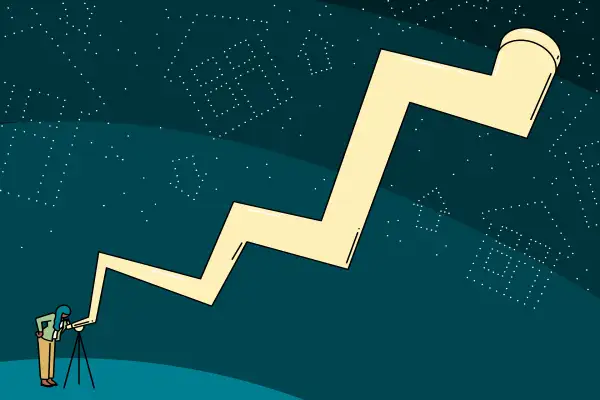Are Super-Low Mortgage Rates Over? 5 Real Estate Experts Share Their Predictions

Low mortgage rates remain a bright spot in the pandemic economy, despite the fact that they have been inching up ever so slightly in recent weeks. This continues a pattern of incremental fluctuations amid uncertainty over the effect of the delta variant of the coronavirus will have on the economic recovery.
But if you’re in the market to buy a home or looking to refinance an existing mortgage, this could be the ideal time to find a lender and lock in a low rate before rates rise more. The average rate on a 30-year home loan recently crossed above 3% for the first time since early summer and currently sits at 2.99%.
In light of that, here are six predictions from housing industry experts on where mortgage rates are headed next. The text has been lightly edited:
Sam Khater
Who he is: Freddie Mac’s chief economist
What he expects: Rates are expected to move higher for the remainder of 2021. We expect rates to average 3.7% for 2022.
His reasoning: There are two main reasons why mortgage rates are expected to rise, inflation and monetary policy. Inflation has been more durable than expectations and is rising faster, broadening to affect more goods and services.
Despite all the economic headwinds, the economy is growing and putting pressure on consumer demand given the already low and limited supply in many different industries. The supply and demand imbalances due to Covid will cause prices to continue to rise and this will impact rates to the upside until the risk of Covid recedes or the impact on the economy is blunted.
On the policy front, the Federal Reserve is positioning for both a removal of asset purchases and they have communicated their desire to start raising the federal funds rate shortly thereafter. Both of these policy actions will cause rates to rise relative to where they would be otherwise.
Selma Hepp
Who she is: CoreLogic deputy chief economist
What she expects: We expect mortgage rates to average 3.4% between now and the end of next year.
Her reasoning: While the rates have been moving mostly sideways since this spring, staying below 3%, the 30-year fixed rate reached 3% in recent weeks. There are a number of factors that are contributing to the increase, including the communication from the Federal Reserve about expected tapering efforts. Nevertheless, further gradual increases will be driven by the broadening of inflation, and inflation expectations, and continued supply shortages of labor, materials and energy.
George Ratiu
Who he is: Manager of economic research at Realtor.com
What he expects: The days of sub-3% mortgage rates are behind us, and rates will move toward 3.5% by year-end.
His reasoning: Along with private bond buyers, the Federal Reserve has been a major purchaser of mortgage-backed securities, to the tune of $40 billion a month during the pandemic. The asset purchases were part of the Fed’s monetary stimulus and designed to ensure liquidity in housing finance and maintain low rates.
However, the Fed’s Federal Open Market Committee indicated after its last meeting that it expects to start tapering its asset purchases in the near future, a clear signal for investors that monetary tightening is in the works. In the wake of the announcement, rates jumped 13 basis points, moving into 3% territory.
In addition to the Fed’s tapering, inflation and bond market expectations will also ensure that rates will continue rising. The 10-year Treasury yield, which heavily influences mortgage rate movements, jumped 20 basis points in the past two weeks and is likely to continue rising. And consumer prices have been rising at a strong pace this year. While the Fed expects inflation to be transitory, we are likely to see sustained inflation well into 2022, adding upward pressure on mortgage rates.
Nadia Evangelou
Who she is: Senior economist and director of forecasting for the National Association of Realtors
What she expects: I don’t expect mortgage rates to rise more than 60 basis points in 2022 from where they are now. Even with this increase, mortgage rates will still be historically low.
Her reasoning: The Fed may raise interest rates by the middle of next year. When the Fed increases its interest rates, banks do too. And when that happens, mortgage rates go up for borrowers. Additionally, the Fed will gradually decrease its purchases of long-term Treasuries and mortgage-backed securities starting likely in November. This strategy will also contribute to increased rates in 2022.
Due to the spread of the coronavirus variant, the economy is still recovering. Hence, consumers shouldn’t panic. This is the first time since 1972 that inflation is higher than the average rate on a 30-year mortgage. Meanwhile, rent prices will continue to rise even further as demand for rental homes gets stronger, putting upward pressure on inflation.
Skylar Olsen
Who she is: Senior director and principal economist at Tomo, a digital real estate and mortgage start-up
What she expects: The jump in rates we saw recently will be the largest we see for a while, but we could see a gradual but modest rise through the end of the year, in the ballpark of 3.15%.
Her reasoning: The economy is still intimately tied to our progress in getting enough people vaccinated and the pandemic behind us. Watching two-year Treasury yields move with new COVID cases is like a market vote on the likelihood of that success. So with the recent delta variant surge and mixed August inflation numbers, the Fed has announced that it will keep holding the line, buying up treasuries and mortgage-backed securities to keep interest rates low until we’ve made a bit more progress — the kind of progress many expect to see soon.
While expected to move soon, the Fed’s lack of urgency was a bit surprising to some, since appreciation in national home prices hit a shocking rate this season. So knowing the support would be sticking around for now, rates popped – the result of a flush of confidence from the investment community.
Until the Fed changes course — and when they do, they'll be cautious and do it gradually — mortgage rates will remain historically low, but continue to move with the confidence inspired or shaken by COVID-19 and other headlines.
Over the coming months, the efficacy of vaccine requirements will prove themselves. We’ll get better at working through it. Debt ceiling drama aside, confidence will continue to rise and we’ll see rates lift in little fits and starts, unable to rise too much more until the world is not so crazy.
More from Money:
Is Now A Good Time To Refinance Your Mortgage?
Rates are subject to change. All information provided here is accurate as of the publish date.

